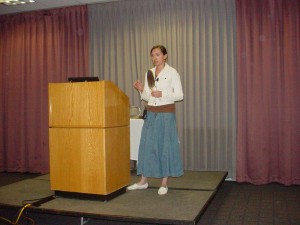Focusing on issues related to mining in the Great Lakes region this year, the annual Indigenous Earth Issues Summit will feature national and internationally renown speakers, workshops and an area with children’s activities.

Aimée Cree Dunn, co-founder and coordinator of the event and contingent instructor for the Center for Native American Studies (CNAS), said the summit, which began in 2008, is meant to make people aware of the environmental issues impacting indigenous people.
“The mission of the Center for Native American Studies is to provide a forum for indigenous voices and perspectives,” Cree Dunn said. “In the world of environmentalism, indigenous voices are frequently ignored, misused, misunderstood or appropriated by the broader environmental movement. It’s a real issue for indigenous activists, trying to avoid, essentially, being colonized or obliterated by the broader environmental movement.”
This year’s summit will inform about proposed and existing mines on the U.S.-ceded territory of the Lake Superior Anishinaabe, Cree Dunn said. These include proposed metallic sulfide mines in the Superior National Forest of Northern Minnesota and what could become the largest open pit ore mine in the world in the Penokee Hills in Northern Wisconsin.
“And, of course, we have the Eagle Mine in our own backyard already undergoing construction,” Cree Dunn said. “With all of these mines in the Lake Superior bioregion, it only made sense to offer a forum for Anishinaabe voices.”
CNAS Director April Lindala said the summit allows people to think critically about their individual relationship with the land and water.
“That relationship is important to recognize, in order for the individual to begin to understand the indigenous relationship, which holds dear the notion that the water, the forest and all of the beings who reside within those lands and waters are one intersecting community,” Lindala said. “How often are individuals challenged to envision their community through a pre-colonial context or even a contemporary indigenous lens? How does one individual or one community contribute to the protection of the earth, specifically the Great Lakes region and all living beings who reside here? How often do audiences have the opportunity to discuss tactical strategies in defense of the earth and all living beings?”
Speakers will include Winona LaDuke, founder of the national initiative, Honor the Earth, who will present on proposed mines in Northern Minnesota, and Paul DeMain, founder of “News from Indian Country,” an independent native journal out of Wisconsin. Mike Wiggins, Bad River tribal chairman, will present on the Gogebic Taconite open pit ore mine proposed for the Penokee Hills. Jessica Koski will present on the Eagle Mine and is a Keweenaw Bay Indian Community citizen and graduate of the Yale School of Forestry and Environmental Studies.
“LaDuke, DeMain, Wiggins and Koski represent some of the people who have been involved for a very long time, for some nearly their entire lifetime, on the mining issue, as well as other environmental issues, impacting indigenous peoples,” Cree Dunn said. “I’m very excited to see what they have to say and to get them all together in one room. The energy will be fantastic.”
Cree Dunn said part of the CNAS’s work is to provide a supportive atmosphere for the area’s indigenous people.
“Given that our mission at the CNAS is to educate people about indigenous issues, bringing people together at this summit to learn about how Anishinaabe communities around the Lake Superior region feel about the mines being proposed or constructed on their doorstep seemed imperative,” Cree Dunn said.
The summit will take place 10 a.m. to 4 p.m. Friday, Feb. 21 in the Whitman Hall Commons. Admission is free; online registration is helpful but not required.






















